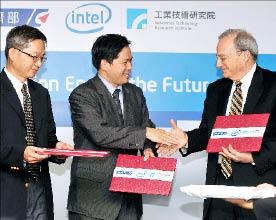Intel Corp yesterday unveiled its latest partnership with Taiwanese research powerhouse Industrial Technology Research Institute (ITRI, 工研院), a US$15-million research program that would run over the next five years to develop new-generation memory technologies for smaller and “greener” chips for mobile devices and cloud-technology-based data centers.
Intel would inject US$5 million in funding and resources, while ITRI and the Ministry of Economic Affairs would channel US$10 million into the research project.
Instead of developing process technologies for chip manufacturing, the collaboration aimed at finding the optimized structure of memory chips that could provide better performance with lower power consumption, vice president and chief technology officer of Intel Justin Rattner told a media briefing in Taipei.

Photo: CNA
“The partnership’s initial project will focus on super-fast, but extremely energy-efficient memory technologies for future ultra-mobile devices, such as Ultrabooks, tablets and smartphones, as well as tomorrow’s exascale and cloud mega-data centers,” Rattner said.
The general director of ITRI’s Information and Communications Research Laboratories, Wu Cheng-wen (吳誠文), said ITRI would focus on developing 3D IC technology to make memory chips work better with microprocessors, or to integrate memory chips with microprocessors.
“With the many patented technologies from Intel and ITRI’s solid 3D IC research and development capabilities, this collaboration will enable the development of future memory technologies,” Wu said.
“This project will also create a new field for local memory chip makers to produce chips [with more value] using their existing technologies, rather than scramble to invest massively on upgrading processing technologies,” he added.
The 3D IC technology for memory chips could effectively reduce the space required by hardware, enable faster data transmission and expand capacity to cope with the uptake of sleek consumer electronic devices, ITRI said.
Wu expects ITRI’s collaboration with Intel to bear fruit within three years, at the earliest. The research house would then transfer the memory technologies and patents to local companies interested in manufacturing new-generation memory chips.
The government-backed ITRI has long been playing a key role in developing cutting-edge technologies to support the development of Taiwan’s industries, particularly the semiconductor industry.
ITRI is in talks with Taiwanese semiconductor companies and mostly memory-chip companies to join this project, Wu said, adding that chip designers, chip packagers and contract chip makers have also expressed interest in participating in this program. He declined to reveal the names of the companies ITRI had approached.
Wu expects local companies to participate in the ITRI-Intel program for one year after the launch.

POWERING UP: PSUs for AI servers made up about 50% of Delta’s total server PSU revenue during the first three quarters of last year, the company said Power supply and electronic components maker Delta Electronics Inc (台達電) reported record-high revenue of NT$161.61 billion (US$5.11 billion) for last quarter and said it remains positive about this quarter. Last quarter’s figure was up 7.6 percent from the previous quarter and 41.51 percent higher than a year earlier, and largely in line with Yuanta Securities Investment Consulting Co’s (元大投顧) forecast of NT$160 billion. Delta’s annual revenue last year rose 31.76 percent year-on-year to NT$554.89 billion, also a record high for the company. Its strong performance reflected continued demand for high-performance power solutions and advanced liquid-cooling products used in artificial intelligence (AI) data centers,

SIZE MATTERS: TSMC started phasing out 8-inch wafer production last year, while Samsung is more aggressively retiring 8-inch capacity, TrendForce said Chipmakers are expected to raise prices of 8-inch wafers by up to 20 percent this year on concern over supply constraints as major contract chipmakers Taiwan Semiconductor Manufacturing Co (TSMC, 台積電) and Samsung Electronics Co gradually retire less advanced wafer capacity, TrendForce Corp (集邦科技) said yesterday. It is the first significant across-the-board price hike since a global semiconductor correction in 2023, the Taipei-based market researcher said in a report. Global 8-inch wafer capacity slid 0.3 percent year-on-year last year, although 8-inch wafer prices still hovered at relatively stable levels throughout the year, TrendForce said. The downward trend is expected to continue this year,

Vincent Wei led fellow Singaporean farmers around an empty Malaysian plot, laying out plans for a greenhouse and rows of leafy vegetables. What he pitched was not just space for crops, but a lifeline for growers struggling to make ends meet in a city-state with high prices and little vacant land. The future agriculture hub is part of a joint special economic zone launched last year by the two neighbors, expected to cost US$123 million and produce 10,000 tonnes of fresh produce annually. It is attracting Singaporean farmers with promises of cheaper land, labor and energy just over the border.

US actor Matthew McConaughey has filed recordings of his image and voice with US patent authorities to protect them from unauthorized usage by artificial intelligence (AI) platforms, a representative said earlier this week. Several video clips and audio recordings were registered by the commercial arm of the Just Keep Livin’ Foundation, a non-profit created by the Oscar-winning actor and his wife, Camila, according to the US Patent and Trademark Office database. Many artists are increasingly concerned about the uncontrolled use of their image via generative AI since the rollout of ChatGPT and other AI-powered tools. Several US states have adopted